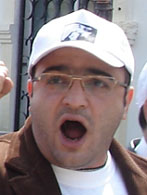New York, December 30, 2009—The Committee to Protect Journalists condemns a new criminal charge filed against imprisoned Azerbaijani editor Eynulla Fatullayev, a 2009 recipient of CPJ’s International Press Freedom Award. Based on Fatullayev’s account and the government’s long record of persecuting the editor, CPJ believes the charge to be fabricated.
On Tuesday, guards at Prison Colony No. 12 in Baku claimed to have searched Fatullayev’s cell and discovered 0.22 grams of heroin in a jacket, according to press reports and CPJ sources. Fatullayev categorically denied possessing the drug and said it was planted on him, defense lawyer Isakhan Ashurov told CPJ. Ashurov, who met with his client today, said Fatullayev had been placed in solitary confinement and was questioned today for four hours.
Baku police charged Fatullayev with narcotics possession, which is punishable by three years in prison. He is already serving an eight-and-a-half-year prison term on politically motivated charges of defamation, incitement of ethnic hatred, terrorism, and tax evasion. The government began prosecuting Fatullayev after his reporting on the 2005 murder of colleague Elmar Huseynov had found a government cover-up in the unsolved slaying.
“We call on authorities with the Azerbaijani Penitentiary Service and the Garadag District Police to drop this new, farcical charge against our colleague Eynulla Fatullayev and to investigate those who planted the drugs on him,” said CPJ Europe and Central Asia Program Coordinator Nina Ognianova. “Azerbaijani authorities have a record of planting narcotics to silence critics. This shameful practice must be stopped at once.”
The timing of the new charge points to government fabrication, Ashurov said. The charge was filed as the European Court of Human Rights deliberates a case brought by Fatullayev against the government of Azerbaijan, which alleges unjust prosecution. The journalist’s father, Emin Fatullayev, told the Azerbaijani service of the U.S. government-funded Radio Free Europe/Radio Liberty that the new charge would ensure his son would remain in jail no matter what the European Court found. The court, based in Strasbourg, France, has authority to review the actions of domestic courts, issue rulings, and levy sanctions. As a member of the Council of Europe and a signer of the European Convention on Human Rights, Azerbaijan is bound by the court’s decision.
CPJ research also shows that Azerbaijani authorities have a history of planting drugs to silence critical journalists. In June 2006, Baku police arrested Sakit Zakhidov, a prominent reporter, poet, and satirist with the pro-opposition newspaper Azadlyg, on heroin charges. Zakhidov denied the charge and said a police officer placed the drug in his pocket during a staged arrest. Three days prior to the arrest, Executive Secretary Ali Akhmedov of the ruling Yeni Azerbaijan party had publicly urged authorities to silence Zakhidov. “No government official or member of parliament has avoided his slanders. Someone should put an end to it,” the regional news Web site EurasiaNet quoted Akhmedov as saying. A Baku court sentenced Zakhidov to three years in prison in October 2006. He was released in April, having served all but two and a half months of his term.
The government has also been a persistent jailer of journalists throughout the past decade, CPJ research shows. With six writers and editors now in prison, Azerbaijan is the seventh worst jailer of journalists in the world.
The new charge against Fatullayev is the latest instance of the government’s years-long persecution of the editor. His two newspapers, the Russian-language weekly Realny Azerbaijan and the Azeri-language daily Gündalik Azarbaycan, both of which reported critically about the government, are now closed.
The government began targeting Fatullayev in early 2007, shortly after he wrote an article to mark the second anniversary of the murder of his one-time editor and mentor Huseynov. The piece, published in Realny Azerbaijan and headlined “Lead and Roses,” accused Azerbaijani authorities of deliberately obstructing the investigation into Huseynov’s killing and ignoring evidence that could lead to the masterminds.
Four days after the piece ran, on March 6, 2007, Fatullayev’s mother received an anonymous phone call. As a “wise woman,” the caller said, she should “talk sense” into her son or “we will send him to Elmar.” Fatullayev reported the threat to the police, but it was he who came under intense investigation.
In April 2007, a Yasamal District Court judge convicted Fatullayev of defaming Azerbaijanis in an Internet posting that was falsely attributed to the journalist. The posting, published on several Web sites, said Azerbaijanis bore some responsibility for the 1992 killings of residents of the restive Nagorno-Karabakh region, according to local news reports. Fatullayev was sentenced to a 30-month term and was jailed immediately. After he was taken into custody, authorities proceeded to evict his two newspapers from their Baku offices, citing purported fire safety and building code violations.
More charges against the editor followed. In October 2007, a judge in the Azerbaijani Court of Serious Crimes found Fatullayev guilty of terrorism, incitement to ethnic hatred, and tax evasion. Fatullayev’s sentences were consolidated, and he was ordered to serve eight years and six months in prison in all.
The terrorism and incitement charges stemmed from a Realny Azerbaijan commentary headlined “The Aliyevs Go to War,” which analyzed possible consequences for Azerbaijan if the United States were to wage war with Iran. The piece sharply criticized the Azerbaijani government’s foreign policy. The tax case was filed after Fatullayev was jailed on other charges and his newspapers had been ousted from their offices, making it impossible to collect the records needed to mount a defense.
